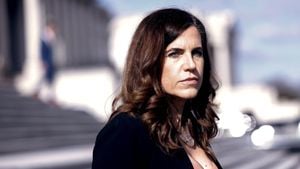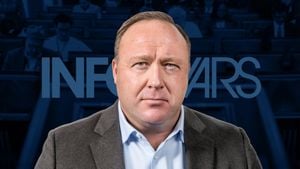Donald Trump has begun to assemble his cabinet for his upcoming second term, and the roster is already filled with both familiar names and some surprising newcomers. This latest round of appointments has ignited discussions about what direction Trump’s administration will take, offering glimpses of how he plans to shape federal governance, particularly as the country prepares for pressing domestic and international challenges.
One of the most prominent picks shaping the narrative is Kristi Noem, the current governor of South Dakota, who has been nominated to lead the Department of Homeland Security (DHS). This appointment has drawn attention, especially since Noem's track record has sparked debate among her constituents. Critics question her commitment to local issues, particularly her response to recent flood disasters back home, where many residents felt neglected. Noem was accused of prioritizing Trump’s border policies over the welfare of her own state's residents, leaving some to wonder if she can effectively juggle national concerns with the urgent needs of South Dakotans.
Adding to the intrigue, Trump has also appointed Kari Lake, the former Arizona gubernatorial candidate and staunch Trump ally, as the head of the government-funded news outlet Voice of America (VOA). Lake, who has been vocal about her belief in the falsehoods surrounding the 2020 election outcomes, expressed her eagerness to broadcast "American values of Freedom and Liberty" globally. Her appointment is seen as integral to Trump’s efforts to counter what he derides as "Fake News Media" and to present his perspective on international platforms.
Other notable appointments include Jacob Helberg, named as the Undersecretary of State for Economic Growth, Energy, and the Environment. Helberg, recognized for his hawkish stance against China, previously held influential roles at Palantir Technologies and is expected to bring his tech expertise to drive economic policies supporting Trump’s hardline strategies. His selection reflects Trump’s continued focus on national security intertwined with economic policy, particularly as the U.S. grapples with complex global economic dynamics.
Another interesting selection is Ronald Johnson, Trump's pick for the ambassadorship to Mexico. Johnson, who has prior experience with the CIA and served as ambassador to El Salvador during Trump’s first term, is expected to play a significant role in implementing Trump’s stringent immigration agenda. He will collaborate closely with other key figures to tackle drug trafficking and migrant issues—elements central to Trump’s platform.
Adding more diversity to the appointments, Leandro Rizzuto Jr., the son of the late billionaire co-founder of Conair, has, surprisingly, been designated as the ambassador to the Organization of American States. His financial background and connections are expected to aid U.S. efforts to strengthen ties within the Americas.
Also nominated for key roles are Mark Meador as the Federal Trade Commissioner, and Kimberly Guilfoyle, prominent conservative personality and fiancée to Donald Trump Jr., as ambassador to Greece. These selections align with Trump's broader strategy of consolidifying loyalty within his ranks and empowering individuals who share his vision.
Among Trump’s concerning choices is the possible replacement of Defense Secretary nominee Pete Hegseth with Florida Governor Ron DeSantis due to serious misconduct allegations, though Hegseth has firmly denied them. Such tumultuous back-and-forth reflects not just the president-elect's dynamic cabinet restructuring but also the undercurrents of loyalty and support within party lines, especially as various factions vie for influence.
Trump’s administration appears to be making substantial strides to solidify its objectives early on. With appointments like Ed Martin as chief of staff at the Office of Management and Budget and Harmeet Dhillon to lead the Justice Department’s civil rights office, it’s clear the former president is seeking to harmonize his team’s efforts around his agenda. Martin has been instrumental in promoting Trump's previous policies, particularly ones aimed at consolidations within federal spending.
Other notable appointments include Christopher Landau as deputy secretary of state and Michael Anton as director of policy planning, both of whom will work closely with Secretary of State Marco Rubio. Given Rubio's own challenging foreign policy nuances, this collaboration will be pivotal as the U.S. navigates complex international waters.
Finally, critics and supporters alike are already gauging how these appointments will play out, especially as many of them are untested or polarizing figures. The incoming administration's strategies could lead to either troubled waters or unexpectedly smooth sailing as they face upcoming governance challenges, including managing the economy and addressing issues around immigration, economic partnerships, and international relations.
Each appointment feeds the narrative of Trump’s continued push for loyalty and adherence to his policies, setting the stage for another controversial chapter of his administration. Now, as the transition approaches, both the supporters and detractors are watching closely to see how this newly formed cabinet will navigate the pressing issues on the horizon.



